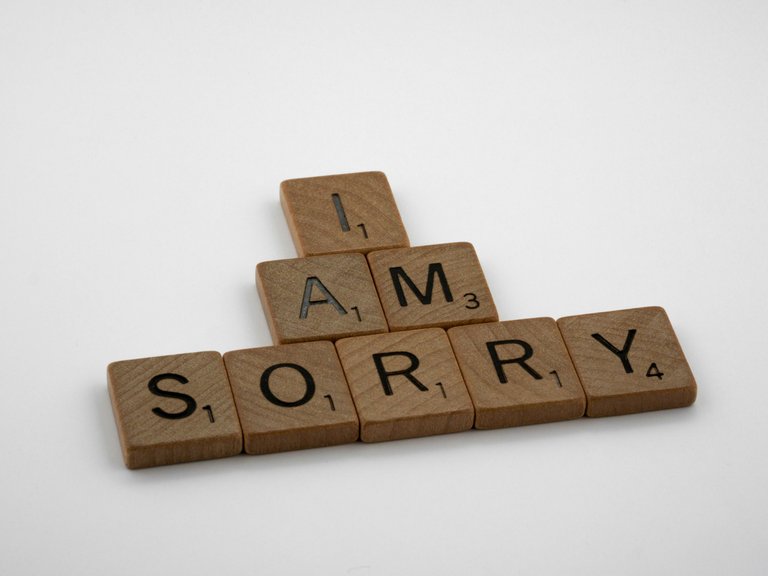How to Learn to Let Go of What Hurts Us: Steps to Free Yourself and Move Forward [ESP-ENG] Cómo Aprender a Soltar lo que nos Hace Daño: Pasos para Liberarte y Avanzar

Today I will talk a little about how I have learned to let go and detach myself from everything that hurts me, I understood that sometimes it is better to be alone, therefore I have managed to be a better person, more productive, I see life from another perspective, my anxiety is controlled and depression is far from here, but like everything, we are human beings who cling to many circumstances and people with whom we are not happy. Among the things I have identified that are most common are the following:

Toxic relationships: applies to couples and friendships that do not bring anything good to your life, yet it is difficult for you to let go, whether due to fear of loneliness, emotional dependence or waiting for the other person to change.

Painful past: Not all people go through the same thing in life, everyone can experience difficult situations, whether due to the death of a family member, experiences that you cannot overcome, or failures that we do not want to repeat.

Negative emotions: Some people hold on to negative emotions such as resentment, anger, or hatred toward themselves or others, which can negatively affect their emotional well-being and interpersonal relationships. Whatever your case, this post will help you.
Let's start with what I think we should do to overcome this situation and move forward.
1. Recognize and Accept Pain:
Feeling pain is inevitable, the first thing we must do is accept what we are going through, understand that nothing lasts forever, pain is temporary and necessary to form a great person who can face any situation in life. It is not just turning the page, it is learning from everything that leaves us a scar, recognizing if we have failed and accepting that not everything in life is perfect, that at times we will go through situations that we do not like but we do not have control over it. , just how we will act when it happens.

2. Identify what hurts you:
Let's identify what is hurting us, whether it is a partner with whom we do not feel happy, a friendship that does not bring anything good to my life, resentment against a family member/friend/neighbor, in some cases it could even be alcohol/sugar/ drugs/social media.
Remember that what does not make you happy and does not give you peace of mind should not be close to your life, no matter how much it hurts us, we must accept it, and therefore let it go.
Example: Every time I see a close friend and he tells me about his life, I get frustrated, I feel anxious, I get depressed, I feel bad, since all his comments are negative, they are derogatory towards other people, he constantly complains and does not contribute to you. nothing good. Take this person into consideration and walk away.
3. Accept Reality:
It is important to understand this Stoic principle that is very latent in my life and that is that "We cannot change what is not in our hands", we can only decide in our own life and what happened previously had to happen, nothing was going to change the destiny of things, avoid overthinking what would have happened if I had done something else to change it, it sounds harsh but the past is already behind us and although it sounds cliché, all that remains is to live in the present, to improve and learn from the mistakes that end up being lessons. Accept your mistakes and learn from them, let them not be your weakness but rather let them be your strength, remember that nature eats the weakest and keeps the most intelligent alive.
4. Practice Detachment:
Detachment involves recognizing that excessive attachment to people, objects or situations can cause suffering. It does not mean that you should stop caring or loving others, but it is about not being emotionally dependent on them in a way that our well-being is tied to their presence or behavior. We must practice emotional detachment in the following way:
Question your thoughts and beliefs: Often, our emotions are tied to thoughts and beliefs ingrained by our upbringing. Learn to challenge the beliefs that keep you emotionally attached to situations or people.
Practice emotional detachment: Whenever you find yourself emotionally clinging to something or someone, pause and ask yourself if you really need that emotional connection to be happy. Try to visualize letting go of that attachment and allowing the situation or person to follow its natural course without affecting you emotionally.
Be grateful and let go: Practice gratitude for past experiences or relationships you've had, but also learn to let go when the time is right. Recognize that all experiences, even painful ones, have taught you valuable lessons and contributed to your personal growth.

5. Forgive yourself and Forgive yourself:
Forgiving those who hurt us is letting go of that emotional burden that we cannot carry all our lives, understanding that these people, like us, have problems or go through circumstances and they themselves cannot control their impulses, nor their parenting patterns, either. It is in our hands to change them, we can only do it for ourselves, understand that we are not perfect either and we make mistakes that make us stronger, do not self-flagellate, what is done is done, all that remains is to recognize and move forward.
6. Cultivate Self-Care:
We have to create positive habits to start changing what is not good for us. I will leave you a few examples of self-care:
• Start loving yourself, appreciating all the good things you have regardless of whether someone tells you or not.
• Trust what you do and don't doubt yourself, don't self-sabotage.
• Exercise, it will help you gain confidence and you will feel great.
• Stop eating poorly, it is only momentary satisfaction, it does not bring anything good to your life and as part of self-care, physical health is essential.
• Stay away from negative people.

In conclusion, remember that all detachment is a process and we must take it progressively, not everything will change immediately, but we must take action on the matter to overcome it and reach peace of mind that you will later appreciate, you will see life more positive, You will realize that everything happened for a reason and it is a reason to move forward, life continues, we must face it with gallantry and, above all, with intelligence.

Images without copyright from https://unsplash.com/

Hoy hablaré un poco de cómo he aprendido a soltar y desapegarme de todo lo que me hace daño, entendí que a veces es mejor estár solo, por ende he logrado ser mejor persona, más productiva, veo la vida desde otra perspectiva, mi ansiedad está controlada y la depresión está lejos de aquí, pero como todo, somos seres humanos que nos aferramos a muchas circunstancias y personas con las cuales no somos felices. Entre las cosas que he identificado que son más comunes son las siguientes:

Relaciones tóxicas: aplica para parejas y amistades que no te aportan nada bueno a tu vida, aún así te cuesta soltar, ya sea por miedo a la soledad, dependencia emocional o esperando a que la otra persona cambie.

Pasado doloroso: No todas las personas pasamos por lo mismo en la vida, cada quien puede vivir situaciones difíciles, ya sea por la muerte de un familiar, experiencias que no puedes superar, o fracasos que no queremos repetir.

Emociones negativas: Algunas personas se aferran a emociones negativas como el resentimiento, la ira o el odio hacia ellos mismos o hacia los demás, lo que puede afectar negativamente su bienestar emocional y sus relaciones interpersonales. Cualquiera que sea tu caso, este post te va a ayudar.
Empecemos por lo que yo considero que debemos hacer para superar esta situación y salir adelante.
1. Reconoce y Acepta el Dolor:
Sentir dolor es inevitable, lo primero que debemos hacer es aceptar por lo que estamos pasando, comprender que nada es para siempre, el dolor es pasajero y necesario para formar una gran persona que pueda afrontar cualquier situación de la vida. No es solo pasar la página, es aprender de todo aquello que nos deja una cicatriz, reconociendo si hemos fallado y aceptando que no todo en la vida es perfecto, que en algunos momentos pasaremos situaciones que no nos agradan pero no tenemos el control sobre ello, solo de cómo actuaremos cuando suceda.

2. Identifica lo que te Hace Daño:
Identifiquemos qué nos está haciendo daño, ya sea una pareja con la cual no nos sentimos felices, una amistad que no aporta nada bueno en mi vida, un resentimiento contra un familiar/amigo/vecino, inclusive en algunos casos podría ser alcohol/azúcar/drogas/redes sociales. Recuerda que lo que no te hace feliz y no te da paz mental no debe estar cerca de tu vida, por más que nos duela debemos aceptarlo, y por ende dejarlo ir.
Ejemplo: Cada vez que veo a un amigo cercano y me cuenta de su vida me frusto, siento ansiedad, me deprimo, me siento mal, ya que todos sus comentarios son negativos, son despectivos hacia otras personas, se queja constantemente y no te aporta nada bueno. Toma consideración de esta persona y aléjate.
3. Acepta la Realidad:
Es importante entender este principio estoico que está muy latente en mi vida y es que "No podemos cambiar lo que no está en nuestras manos", solo podemos decidir en nuestra vida propia y lo que sucedió con anterioridad tenía que suceder, nada iba a cambiar el destino de las cosas, evita sobrepensar qué hubiese pasado si hubiese hecho otra cosa para cambiarlo, suena duro pero ya el pasado quedó atrás y aunque suene cliché solo queda vivir el presente, para mejorar y aprender de los errores que terminan siendo enseñanzas. Acepta tus errores y aprende de ellos, que no sean tu debilidad sino que sean tu fortaleza, recuerda que la naturaleza se come al más débil y mantiene vivo al más inteligente.
4. Practica el Desapego:
El desapego implica reconocer que el apego excesivo a personas, objetos o situaciones puede generar sufrimiento. No significa que debas dejar de preocuparte o amar a los demás, sino que se trata de no depender emocionalmente de ellos de manera que nuestro bienestar esté ligado a su presencia o comportamiento. Debemos practicar el desapego emocional de la siguiente manera:
Cuestiona tus pensamientos y creencias: A menudo, nuestras emociones están ligadas a pensamientos y creencias arraigadas por nuestra crianza. Aprende a desafiar las creencias que te mantienen atado emocionalmente a situaciones o personas.
Practica el desapego emocional: Cada vez que te encuentres aferrándote emocionalmente a algo o alguien, haz una pausa y pregúntate si realmente necesitas esa conexión emocional para ser feliz. Intenta visualizar soltando ese apego y permitiendo que la situación o persona siga su curso natural sin que te afecte emocionalmente.
Agradece y suelta: Practica la gratitud por las experiencias pasadas o las relaciones que has tenido, pero también aprende a soltarlas cuando sea el momento adecuado. Reconoce que todas las experiencias, incluso las dolorosas, te han enseñado lecciones valiosas y han contribuido a tu crecimiento personal.

5. Perdónate y Perdona:
Perdonar a los que nos hicieron daño es soltar esa carga emocional que no podemos llevar toda la vida, comprender que esas personas al igual que nosotros tienen problemas o pasan por circunstancias y ellas mismas no pueden controlar sus impulsos, ni sus patrones de crianza, tampoco está en nuestras manos cambiarlos, solo podemos hacerlo por nosotros mismos, entender que tampoco somos perfectos y cometemos errores que nos hacen más fuertes, no te autoflageles, ya lo hecho, hecho está, solo queda reconocer y seguir adelante.

6. Cultiva el Autocuidado:
Hay que crear hábitos positivos para empezar a cambiar lo que no nos hace bien, te dejaré unos cuantos ejemplos de autocuidado:
• Empieza a amarte a ti mismo, a apreciar todas las cosas buenas que tienes sin importar si alguien te las dice o no.
• Confía en lo que haces y no dudes de ti mismo, no te autosabotees.
• Haz ejercicio, te ayudará a tomar confianza y te sentirás muy bien.
• Deja de comer mal, solo es satisfacción momentánea, no te aporta nada bueno a tu vida y como parte del autocuidado la salud física es primordial.
• Aléjate de las personas negativas.

Como conclusión, recuerda que todo desapego es un proceso y debemos ir llevándolo progresivamente, no todo cambiará de inmediato, pero hay que tomar cartas en el asunto para superarlo y llegar a la paz mental que luego agradecerás, vas a ver la vida más positiva, te darás cuenta de que todo pasó por algo y es un motivo para seguir adelante, la vida continua, debemos afrontarla con gallardía y, sobre todo, con inteligencia.

Imagenes sin derecho de autor de https://unsplash.com/
Congratulations @leonardomora94! You have completed the following achievement on the Hive blockchain And have been rewarded with New badge(s)
Your next payout target is 50 HP.
The unit is Hive Power equivalent because post and comment rewards can be split into HP and HBD
You can view your badges on your board and compare yourself to others in the Ranking
If you no longer want to receive notifications, reply to this comment with the word
STOPTo support your work, I also upvoted your post!
Te dejaremos esta guía donde podrás ver como citar correctamente las fuentes, esta bien tomar las imagenes desde Unsplash, pero necesitamos el link correcto para poder verificar que vienen de ahí, por favor lee el siguiente post para orientarte al respecto:
USO CORRECTO DE FUENTES EN HIVE
Cualquier duda puedes escribirnos en nuestras redes, te las dejamos en el banner de abajo 👇🏼
Saludos 👋🏼🪸
Gracias por apoyar a Aliento como proyecto. Si tienes dudas puedes escribir en nuestro servidor, en el canal #dudasypreguntas, donde con gusto te atenderemos.